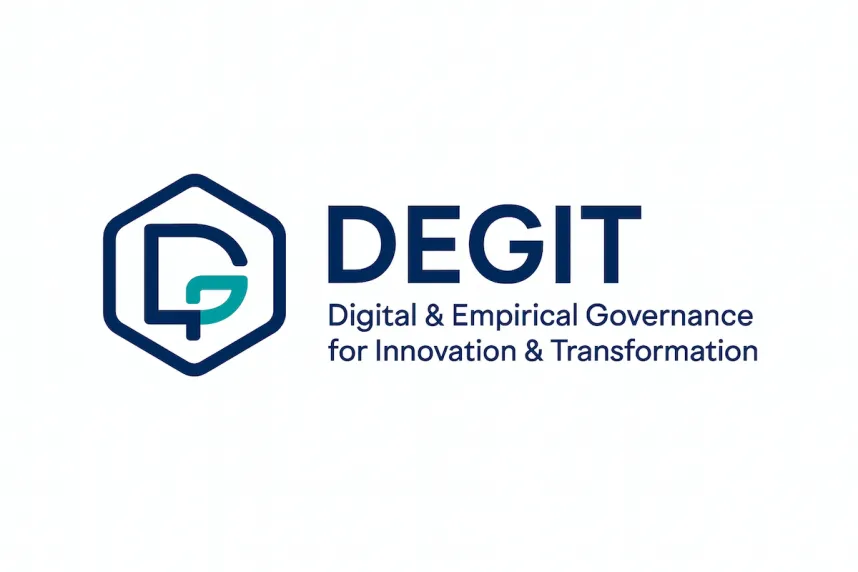DEGIT: Digital & Empirical Governance for Innovation & Transformation

Faculty, Bremen International Graduate School of Social Sciences (BIGSSS)

Affiliated PhD Fellow at the Bremen International Graduate School of Social Sciences (BIGSSS) | Constructor University

Phd Research Fellow
Constructor University
DEGIT (Digital & Empirical Governance for Innovation & Transformation) bridges academic insight and policy relevance, operating at the intersection of strategic management, data analytics, and digital transformation. Using empirical research and computational tools, the lab explores how organizations, industries, and regions adapt to digital change. Its work generates actionable insights that inform innovation governance, public–private partnerships, and digital transformation strategies at national, European, and international levels. DEGIT aims to strengthen institutional capacity, guide decision-making, and shape evidence-based policies and strategies, empowering institutions to navigate digital and organizational change responsibly, ethically, and successfully. The lab investigates how digital technologies, from artificial intelligence to cloud computing, reshape governance structures, institutional practices, and strategic decision-making across national and international contexts.
Key questions include:
- How can strategic management leverage quantitative data analytics to improve innovation and organizational performance?
- How can public institutions govern digital transformation responsibly, effectively, and ethically while overcoming structural barriers?
- How can data-driven foresight approaches support policy design, regional growth, and transformation in a global digital economy?
- Advanced Data Analytics and Quantitative Methods for Innovation, Policy, and Organizational Research
- Strategic Management of Digital Transformation and International Strategic Dynamics
- Data-Driven Foresight, Green Innovation, and Sustainable Entrepreneurship
- Empirical Digital Governance, Institutional Change, and Evidence-Based Policy-making
- Ethics and Governance of Artificial Intelligence and Algorithmic Decision-Making
- Digital Technologies, Organizational Resilience, and Crisis Preparedness
Prof. Sohaib Hassan’s research forms the foundation of DEGIT Lab, promoting strategic insight through empirical, data-driven analysis of digitalization, innovation, and resilience. Key contributions include:
- Empirical studies of SME digital transformation, analyzing how digital diffusion affects innovation performance and organizational capabilities
- Digital business foresight using keyword analysis, co-word mapping, and CorEx topic modeling to identify weak and strong signals of technological change
- Startup profiling within the EU Smart Specialization Strategy, applying text mining to support regional innovation and evidence-based policy design
- Research on coopetition and strategic positioning in digital markets, highlighting how firms balance collaboration and competition under conditions of technological change
- Modeling adoption behavior of social media and public cloud technologies in SMEs, linking managerial perceptions, infrastructural readiness, and regulatory frameworks to strategic adoption choices
- Organizational resilience and crisis continuity research, examining how digital infrastructures and preparedness strategies (e.g., KontiKat project) strengthen civil security and business continuity during disasters
DEGIT is led by Prof. Dr. Sohaib S. Hassan, who supervises the doctoral research of an interdisciplinary team examining the strategic and organizational dimensions of digital transformation. Their projects advance DEGIT’s mission by producing large-scale empirical evidence and quantitative insights that inform governance reform, guide strategic decision-making, and support organizations in navigating technological and institutional change.
Current doctoral researchers include:
- Asif Shahriar: His doctoral research investigates the ethics and governance of artificial intelligence in education. He develops institutional frameworks aligned with GDPR, the EU AI Act, and federated learning architectures. By examining how personalized learning systems balance personalization, privacy, accountability, and transparency, his work contributes to broader debates on the responsible adoption of AI in public institutions.
- Qamar Altaf: His doctoral research analyzes the digital transformation of government organizations, with particular attention to how bureaucratic inertia, regulatory complexity, and federal decentralization condition strategic capacity and innovation trajectories in German public administration. His work identifies institutional barriers and coordination failures in multi-level governance systems, offering critical insights into the challenges of advancing digital governance within structurally complex polities.
Together, their work supports DEGIT Lab’s broader mission to help educational, governmental, and enterprise-level organizations navigate digital change with strategic clarity, ethical integrity, and evidence-based decision-making.
The lab’s research is structured around five interrelated directions:
- Ethical and Strategic Governance of Artificial Intelligence: Research on AI-driven systems, including personalized learning solutions, with a particular focus on accountability, transparency, and ethical integration in both public and private organizations. This strand engages with evolving regulatory and institutional frameworks such as the EU AI Act, GDPR, and national education and governance systems, aiming to develop standards for responsible AI adoption and institutional trust.
- Data-Driven Governance and Crisis Management: Development of adaptive governance models and oversight mechanisms that apply quantitative and computational methods. Research in this area explores how data analytics, predictive modeling, and feedback loops can enhance continuity planning, ethical AI oversight, and evidence-based decision-making across educational institutions, public administration, and businesses.
- Institutional and Public-Sector Dynamics of Digital Transformation: Systematic analysis of structural and institutional barriers to digitalization in the public sector, including bureaucratic inertia, regulatory constraints, outdated infrastructures, and skills gaps. Special attention is given to the decentralized federal system in Germany, where coordination challenges generate uneven digital maturity across Länder and municipalities. Comparative research extends this analysis to multi-level governance contexts, identifying bottlenecks, barriers, and institutional success factors for effective digital transformation.
- Sustainable Entrepreneurship and Green Innovation Foresight: Quantitative research on how radical innovations and entrepreneurial ventures contribute to sustainable transitions. This includes the use of foresight and data-mining techniques to detect emerging opportunities, evaluate investor confidence, and assess the role of venture capital in scaling green technologies.
- SME Innovation, Digital Foresight, and Regional Development: Large-scale empirical studies on SME digital adoption, innovation performance, and organizational capabilities. This line of research combines foresight methodologies such as text mining, co-word analysis, and topic modeling to identify weak and strong signals of technological change. It examines how digitalization drives entrepreneurial discovery, regional economic growth, and evidence-based policy design, particularly within European integration and governance frameworks.
- Digitalization, Continuity and Civil Security: Research on the organizational dimension of resilience, focusing on how digitalization shapes management practices and strategic decision-making during crises. Particular attention was given to SMEs and their ability to adapt strategies under conditions of uncertainty. The project employed data-science and quantitative methods to analyze the role of digital infrastructures in supporting business continuity and civil security, as part of the BMBF KontiKat.
- Entrepreneurial Discovery and Smart Specialization Analytics: Development of data-driven startup profiling and entrepreneurial discovery processes to support regional policy and investment priorities. Using large-scale text mining and computational analytics, the project generated evidence for innovation governance within the EU Horizon 2020 research and innovation program.
- Data-Driven Approaches for Innovation Foresight: Creation of advanced methods for keyword analysis, co-word mapping, and CorEx-based topic modeling. The toolkit applies quantitative data-science techniques to detect weak and strong innovation signals, developed under the EU Horizon 2020 research and innovation program.
- SME Digital Adoption & Performance: Multi-study program applying quantitative analyses to investigate how digital diffusion, organizational capabilities, and regulatory context shape SME innovation outcomes. The research provides large-scale evidence on the relationship between digital adoption and firm-level competitiveness, undertaken as part of the BMBF KontiKat.
- Knowledge and Institutional Dynamics of International Strategic Management: DFG-funded research conducting large-scale quantitative analyses of outward FDI, location strategies, and European integration. The project examines how multinational enterprises pursue knowledge-seeking strategies across borders and how institutional environments shape firm-level strategic decision-making and innovation trajectories.
DEGIT Lab actively engages with:
- National and EU-level organizations
- Ministries of education and digital affairs
- SME networks and innovation hubs
- Policy thinktanks and academic consortia
- Is digitalization a source of innovation? Exploring the role of digital diffusion in SME innovation performance
- Digital business foresight: Keyword-based analysis and CorEx topic modeling
- Review of Enablers and Barriers of Sustainable Business Practices in SMEs
- Dynamics of digital change–measuring the digital transformation and its impacts on the innovation activities of SMEs
- Mapping the wave of industry digitalization by co-word analysis: An exploration of four disruptive industries
- Identifying entrepreneurial discovery processes with weak and strong technology signals: a text mining approach
- “Frenemies” of innovation: understanding the role of coopetition in service innovation in emerging markets
- Perception or capabilities? An empirical investigation of the factors influencing the adoption of social media and public cloud in German SMEs
- Infrastructuring for organizational resilience: Experiences and perspectives for business continuity
- Data-based startup profile analysis in the European Smart Specialization Strategy: A text mining approach
- Digitalisierung und Zivile Sicherheit: Zivilgesellschaftliche und betriebliche Kontinuität in Katastrophenlagen (KontiKat)
- Economic institutions and the outward fdi location strategies of emerging market multinational business groups: Evidence from central and eastern European countries
- What does location choice reveal about knowledge-seeking strategies of emerging market multinationals in the EU?
- European Integration and Outward FDI from Central and Eastern Europe–is There Any Evidence of Knowledge‐Seeking?

